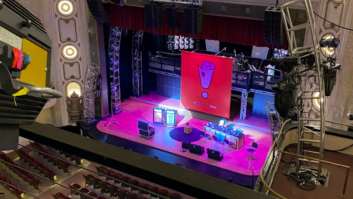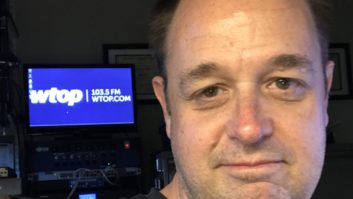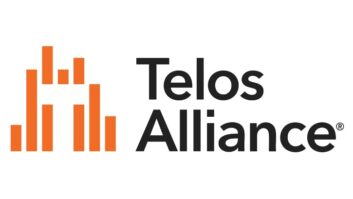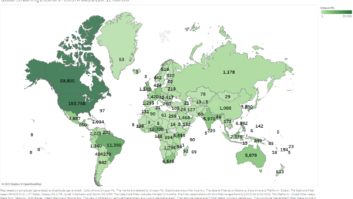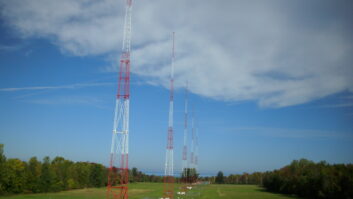In April of 1967, I got a ride out to Lambert Field in St. Louis, got on an Ozark Airlines DC-9 and took off for Chicago.
I was 19 and it was my first time on a plane. I remember being extremely nervous; but that had nothing to do with the flight. In fact, I instantly liked flying and started taking lessons soon afterwards.
Instead I was worried about how I would do a few weeks later, when I planned to walk into the FCC’s District Office in downtown Chicago to take the test for the First Class Radiotelephone Operator License.

The test for the “First Phone” was given on specific dates and only at an FCC office in the presence of an FCC field engineer. It was short (my memory places it at 50 questions) but rigorous, and could not be attempted until the applicant had passed the Second Class Radiotelephone License. That test was 100 questions long and was loaded up with a lot of electronic theory. In those pre-calculator days, the Second Class was by far the harder test, at least in my opinion.
Eventually I took the test and sweated out the notification period. Soon after, my “ticket” arrived. I was a broadcast engineer!
Well, not quite. I had the license, sure. But I lacked the knowledge that the license was supposed to represent.
I, like many other holders of this all-important piece of paper, was a Six-Week Wonder.
BECOMING A WONDER
Six-Week Wonders, and the schools that produced them by the thousands, were the direct result of the licensing requirement.
That requirement was valid enough. Broadcasting equipment had improved dramatically since the inception of commercial broadcasting in the 1920s; but even in 1967, 20 years after the invention of the transistor, transmitting equipment was almost exclusively built with vacuum tubes.
Unlike modern components, those failed often (mean times between failure were sometimes under 10,000 hours — only a bit more than a year of constant operation). On top of that, as tubes aged, they — and the components around them — drifted. If the air conditioning hiccupped, or the crystal oven heater burned up, your little 500-watt AM, which had been chugging merrily along right on frequency, would begin to wander up and down the band right along with the building temperature.
Although operators could legally control certain classes of broadcast stations with the more limited Third Class “Permit” (provided it included a “broadcast endorsement”), someone in the bowels of the commission correctly realized that it would be a good thing if every station had at least one person (and for some classes of station, one on duty at all times) who actually knew what to do when things went awry.
Presto: the First Class Radiotelephone License was born. But, as with most of these things, the whole process came with unintended consequences.
ENGINEERS IN DEMAND
In 1967, the Vietnam War was raging. That conflagration forced over a million young men into the service. (By 1968, I would be included in their number.) There weren’t that many engineers with the “Ticket” to start with; this additional manpower drain left stations scrambling for people who possessed the all-important license.
The overall demand fueled a rapid growth in what were known as the “Six-Week Wonder” schools. These schools advertised in all of the broadcasting trade publications, and the message, like this one I copied from the March 2, 1967 issue of Broadcasting, was a simple one: “Elkins Radio License School of Chicago-Six weeks quality instruction in laboratory methods and theory leading to the FCC First Class License. Fully G.I. Approved. 14 East Jackson St., Chicago 4, Ill.”
Well, fine. I had already bought a book (which I still own) called “Electronic Communications” by Robert L. Shrader, and had been plowing through it, trying to work it all out. But the book was a ponderous thing, and I had no way of knowing which facts were critical. Did I need to know the rule for current and voltage through an inductor or a capacitor? Or both? Or neither? I gamely fought with it for a few months, but finally decided that I would be 90 before I mastered it all.
And then, an epiphany: How about letting the good folks up at the Elkins Radio License School in Chicago hypnotize me for six weeks? It seemed to me that was the only way to absorb so much information in so short a time. I enrolled, was accepted (presumably because the check cleared the bank, and I was able to sign the application) and was soon on my way in the DC-9.
Hypnotism, it turned out, was just about spot on. The advertising for the school was accurate. The “quality instruction” did indeed lead to the FCC First Class License. The curriculum could take credit for that because, day after day, instructors addressed each and every possible iteration of every problem in the test question pool.
I learned that I did indeed need to know the characteristics of current and voltage applied both to an inductor and capacitor, and learned the way to memorize those: ELI the ICE man, which translates to voltage E Leads I (current) through an L (inductor), and I in a C (capacitor) leads E. After six weeks, I had no idea why that phenomenon was so, but I could tell you with absolute 100-percent recall that it was. And so, I passed.
THE FIRST GENERAL
The FCC got out of the First Class business in 1982, and replaced all First Phones with lifetime General Class Licenses as they expired. Those were issued as lifetime licenses, but are not required for any broadcast work. The SBE began its voluntary certification process in 1975, and certification by that organization is generally recognized as equivalent to (or better than) the old First Phone.
I have mixed feelings about the demise of the First Phone and the schools that “taught the test.”
On the one hand, it was a bit of a farce. Anyone with the ability to memorize could get the license for around $400 and six weeks in Los Angeles, New Orleans, Dallas, Chicago or Minneapolis.
On the other hand, though, how many Six-Week Wonders went on to get jobs and to learn from people who really were engineers? My ticket gave me the chance to get a good paying job, first at a 5 kW AM rocker in St. Louis as a vacation relief engineer, and then as a staff engineer at WGEM(AM/FM/TV) in Quincy, Ill. Those jobs gave me the opportunity to learn from some extremely talented (and very patient!) engineers, and to move on and up over the years.
As I progressed, I went back to Shrader’s book and learned all about voltage, current, inductors and capacitors and the like. The knowledge has served me well over the course of my career.
A first-class engineer? The young kid with the brand-new First Class Radiotelephone License issued on April 25, 1967 definitely was not that. But I like to think that over the next 46 years, I ultimately became one.
Jim Withers is owner of KYRK(FM) in Corpus Christi, Texas, and a longtime RW contributor. He has four decades of broadcast engineering experience at radio and television stations around the country.
Comment on this or any story; email[email protected]with “Letter to the Editor” in the subject line.






